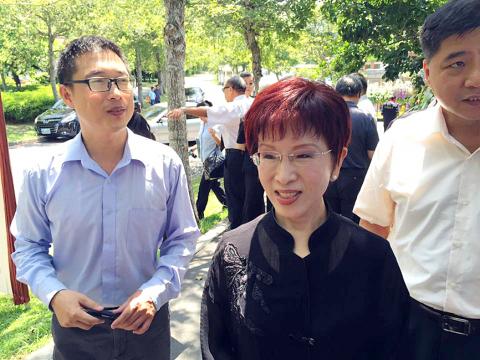Chinese Nationalist Party (KMT) Chairwoman Hung Hsiu-chu (洪秀柱) yesterday evening issued a strongly worded statement, calling the legislature’s passage of the Act Governing the Handling of Ill-gotten Properties by Political Parties and Their Affiliate Organizations (政黨及其附隨組織不當取得財產處理條例) “unconstitutional.”
“The so-called ‘Democratic Progressive’ Party used ‘majority violence’ to pass a bad law that is illegal, unconstitutional, anti-democratic and against the rule of law, in an attempt to shape a political environment for ‘one-party dictatorship’ for its selfish ends. This is a sad event for Taiwan and for Taiwanese democracy,” Hung said in the statement.
Earlier yesterday, before the bill’s passage, Hung had said the bill would push the nation’s democracy backward and aggravate social divisions.

Photo: Lin Ching-lun, Taipei Times
Hung made the remarks yesterday morning in Yilan County, on the sidelines of the funeral of former Yilan County commissioner Lu Kuo-hua’s (呂國華) mother, which coincided with the legislature’s discussion of a bill to deal with the KMT’s ill-gotten assets.
“I have reiterated several times that the KMT’s opposition to the draft bill is not tantamount to an attempt to protect our party assets. We simply do not agree with the passage of something that is illegal and unconstitutional,” Hung said.
The bill would only retard Taiwan’s democratic growth, Hung said, accusing the Democratic Progressive Party (DPP) of intensifying political divisions and causing social instability.
Criticizing the DPP as arbitrary, violent and impudent, Hung said that the KMT would like to see reconciliation between the pan-blue and pan-green camps, but it is puzzled by the ruling party’s actions.
“If the legislature uses ‘majority violence’ and passes the draft bill, the KMT will continue to survive and stride forward with a firm and steady step,” Hung said.
Separately yesterday, former vice president Wu Den-yih (吳敦義) — who is said to be interested in running for KMT chair next year — said the party should return all its assets that were not obtained in a justifiable manner, or they would forever be a “cash machine” for the DPP.
“This is not the sort of baggage the healthy and hard-working KMT should carry. Putting down the baggage in a fair and rational manner as soon as possible is the right thing to do,” Wu said.
Wu said while the KMT caucus stood little chance of preventing the DPP from passing the draft bill, the principles of justice and equality would be better upheld if the matter is addressed via filing for a constitutional interpretation instead of a political struggle.
However, the former vice president took issue with the use of the term “ill-gotten” in the bill’s title, saying that several Control Yuan members and the former DPP administration had conducted exhaustive probes into the KMT’s assets.
Additional reporting by Lin Liang-sheng.

Honor guards are to stop performing changing of the guard ceremonies around a statue of Chiang Kai-shek (蔣介石) to avoid “worshiping authoritarianism,” the Ministry of Culture said yesterday. The fate of the bronze statue has long been the subject of fierce and polarizing debate in Taiwan, which has transformed from an autocracy under Chiang into one of Asia’s most vibrant democracies. The changing of the guard each hour at the Chiang Kai-shek Memorial Hall in Taipei is a major tourist attraction, but starting from 9am on Monday, the ceremony is to be moved outdoors to Democracy Boulevard, outside the eponymous blue-and-white memorial

The Chinese Nationalist Party (KMT) supports peaceful unification with China, and President William Lai (賴清德) is “a bit naive” for being a “practical worker for Taiwanese independence,” former president Ma Ying-jeou (馬英九) said in an interview published yesterday. Asked about whether the KMT is on the same page as the Democratic Progressive Party (DPP) and the Taiwan People’s Party (TPP) on the issue of Taiwanese independence or unification with China, Ma told the Malaysian Chinese-language newspaper Sin Chew Daily that they are not. While the KMT supports peaceful unification and is against unification by force, the DPP opposes unification as such and

The annual Taipei Summer Festival, which starts today, is to tone down its fireworks displays, the Taipei Department of Information and Tourism said on Monday. Fireworks displays are to be held at the riverside site in Datong District’s (大同) Dadaocheng (大稻埕) area on four days at this year’s festival, with the first today, and then on Wednesday next week, July 31 and Aug. 10, the department said. There were eight displays last year, with the reduction aimed at minimizing inconvenience to local residents, it said. The first three shows, which are all on Wednesdays, are to last for five minutes, while the final

EYE ON MAYORS: The DPP would file a complaint with the Control Yuan against Ko and Chiang over their handling of reports of abuse at a preschool in the city The Taipei City Government’s belated response under Mayor Chiang Wan-an (蔣萬安) and his predecessor, Taiwan People’s Party Chairman Ko Wen-je (柯文哲), to alleged child sex abuse at a kindergarten resulted in more children being victimized, two Taipei City Councilors said yesterday. A Taipei preschool teacher has been charged with sexually abusing six children from 2021 to last year at a school registered to his mother. Prosecutors are reportedly considering additional charges amid a wave of new accusations allegedly linking the suspect to 20 other abused children and the discovery at his residence of more than 600 sexually explicit videos featuring minors. The